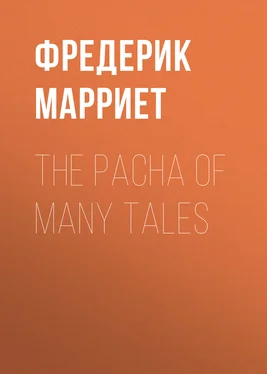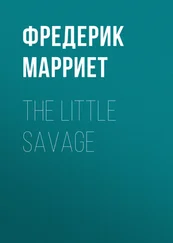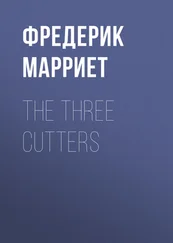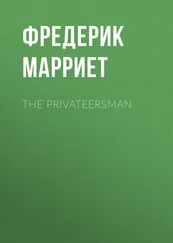Фредерик Марриет - The Pacha of Many Tales
Здесь есть возможность читать онлайн «Фредерик Марриет - The Pacha of Many Tales» — ознакомительный отрывок электронной книги совершенно бесплатно, а после прочтения отрывка купить полную версию. В некоторых случаях можно слушать аудио, скачать через торрент в формате fb2 и присутствует краткое содержание. Жанр: Детские приключения, literature_19, foreign_antique, foreign_prose, foreign_children, на английском языке. Описание произведения, (предисловие) а так же отзывы посетителей доступны на портале библиотеки ЛибКат.
- Название:The Pacha of Many Tales
- Автор:
- Жанр:
- Год:неизвестен
- ISBN:нет данных
- Рейтинг книги:3 / 5. Голосов: 1
-
Избранное:Добавить в избранное
- Отзывы:
-
Ваша оценка:
- 60
- 1
- 2
- 3
- 4
- 5
The Pacha of Many Tales: краткое содержание, описание и аннотация
Предлагаем к чтению аннотацию, описание, краткое содержание или предисловие (зависит от того, что написал сам автор книги «The Pacha of Many Tales»). Если вы не нашли необходимую информацию о книге — напишите в комментариях, мы постараемся отыскать её.
The Pacha of Many Tales — читать онлайн ознакомительный отрывок
Ниже представлен текст книги, разбитый по страницам. Система сохранения места последней прочитанной страницы, позволяет с удобством читать онлайн бесплатно книгу «The Pacha of Many Tales», без необходимости каждый раз заново искать на чём Вы остановились. Поставьте закладку, и сможете в любой момент перейти на страницу, на которой закончили чтение.
Интервал:
Закладка:
Frederick Marryat
The Pacha of Many Tales
Volume One–Chapter One
Every one acquainted with the manners and customs of the East must be aware that there is no situation of eminence more unstable, or more dangerous to its possessor, than that of a pacha. Nothing, perhaps, affords us more convincing proof of the risk which men will incur, to obtain a temporary authority over their fellow-creatures, than the avidity with which this office is accepted from the sultan who, within the memory of the new occupant, has consigned scores of his predecessors to the bow-string. It would almost appear, as if the despot but elevated a head from the crowd, that he might obtain a more fair and uninterrupted sweep for his scimitar, when he cut it off; only exceeded in his peculiar taste by the king of Dahomy, who is said to ornament the steps of his palace with heads, fresh severed, each returning sun, as we renew the decoration of our apartments from our gay parterres. I make these observations, that I may not be accused of a disregard to chronology, in not precisely stating the year, or rather the months, during which flourished one of a race, who, like the flowers of the cistus, one morning in all their splendour, on the next, are strewed lifeless on the ground to make room for their successors. Speaking of such ephemeral creations, it will be quite sufficient to say, “There was a Pacha.”
Would you inquire by what means he was raised to the distinction? It is an idle question. In this world, pre-eminence over your fellow creatures can only be obtained, by leaving others far behind in the career of virtue or of vice. In compliance with the dispositions of those who rule, faithful service in the one path or the other will shower honour upon the subject, and by the breath of kings he becomes ennobled to look down upon his former equals.
And as the world spins round, the why is of little moment. The honours are bequeathed, but not the good, or the evil deeds, or the talents by which they were obtained. In the latter we have but a life interest, for the entail is cut off by death. Aristocracy in all its varieties is as necessary for the well binding of society, as the divers grades between the general and the common soldier are essential in the field. Never then inquire, why this or that man has been raised above his fellows; but, each night as you retire to bed, thank Heaven that you are not a King .
And if I may digress, there is one badge of honour in our country, which I never contemplate without serious reflection rising in my mind. It is the bloody hand in the dexter chief of a baronet,—now often worn, I grant, by those who, perhaps, during their whole lives have never raised their hands in anger. But my thoughts have returned to days of yore—the iron days of ironed men , when it was the symbol of faithful service in the field—when it really was bestowed upon the “hand embrued in blood;” and I have meditated, whether that hand, displayed with exultation in this world, may not be held up trembling in the next—in judgment against itself.
And I, whose memory stepping from one legal murder to another, can walk dry-footed over the broad space of five-and-twenty years of time,—but the “damned spots” won’t come out—so I’ll put my hands in my pockets and walk on.
Conscience, fortunately or unfortunately, I hardly can tell which, permits us to form political and religious creeds, most suited to disguise or palliate our sins. Mine is a military conscience; and I agree with Bates and Williams, who flourished in the time of Henry the Fifth, that it is “all upon the king:” that is to say, it was all upon the king; but now our constitution has become so incomparably perfect, that “the king can do no wrong;” and he has no difficulty in finding ministers, who voluntarily impignorating themselves for all his actions in this world, will, in all probability, not escape from the clutches of the great Pawnbroker in the next—from which facts I draw the following conclusions:—
First. That his majesty (God bless him!) will go to heaven.
Secondly. That his majesty’s ministers will all go to the devil.
Thirdly. That I shall go on with my story.
As, however, a knowledge of the previous history of our pacha will be necessary to the development of our story, the reader will in this instance be indulged. He had been brought up to the profession of a barber; but, possessing great personal courage, he headed a popular commotion in favour of his predecessor, and was rewarded by a post of some importance in the army. Successful in detached service, while his general was unfortunate in the field, he was instructed to take off the head of his commander, and head the troops in his stead; both of which services he performed with equal skill and celerity. Success attended him, and the pacha, his predecessor, having in his opinion, as well as in that of the sultan, remained an unusual time in office, by an accusation enforced by a thousand purses of gold, he was enabled to produce a bowstring for his benefactor; and the sultan’s “firmaun” appointed him to the vacant pachalik. His qualifications for office were all superlative: he was very short, very corpulent, very illiterate, very irascible, and very stupid.
On the morning after his investment, he was under the hands of his barber, a shrewd intelligent Greek, Mustapha by name. Barbers are privileged persons for many reasons: running from one employer to another to obtain their livelihood, they also obtain matter for conversation, which, impertinent as it may sometimes be, serves to beguile the tedium of an operation which precludes the use of any organ except the ear. Moreover, we are inclined to be on good terms with a man, who has it in his power to cut our throats whenever he pleases—to wind up; the personal liberties arising from his profession, render all others trifling; for the man who takes his sovereign by the nose, cannot well after that be denied the liberty of speech.
Mustapha was a Greek by birth, and inherited all the intelligence and adroitness of his race. He had been brought up to his profession when a slave; but at the age of nineteen he accompanied his master on board of a merchant vessel bound to Scio; this vessel was taken by a pirate, and Demetrius (for such was his real name) joined this band of miscreants, and very faithfully served his apprenticeship to cutting throats, until the vessel was captured by an English frigate. Being an active, intelligent person, he was, at his own request, allowed to remain on board as one of the ship’s company, assisted in several actions, and after three years went to England, where the ship was paid off. For some time, Demetrius tried to make his fortune, but without success, and it was not until he was reduced to nearly his last shilling, that he commenced the trade of hawking rhubarb about in a box: which speculation turned so profitable, that he was enabled in a short time to take his passage in a vessel bound to Smyrna, his own country. This vessel was captured by a French privateer; he was landed, and, not being considered as a prisoner, allowed to act as he thought proper. In a short time he obtained the situation of valet and barber to a “millionaire,” whom he contrived to rob of a few hundred Napoleons, and with them to make his escape to his own country. Demetrius had now some knowledge of the world, and he felt it necessary that he should become a True Believer, as there would be more chance of his advancement in a Turkish country. He dismissed the patriarch to the devil, and took up the turban and Mahomet; then quitting the scene of his apostacy, recommenced his profession of barber in the territory of the pacha; whose good-will he had obtained previous to the latter’s advancement to the pachalik.
Читать дальшеИнтервал:
Закладка:
Похожие книги на «The Pacha of Many Tales»
Представляем Вашему вниманию похожие книги на «The Pacha of Many Tales» списком для выбора. Мы отобрали схожую по названию и смыслу литературу в надежде предоставить читателям больше вариантов отыскать новые, интересные, ещё непрочитанные произведения.
Обсуждение, отзывы о книге «The Pacha of Many Tales» и просто собственные мнения читателей. Оставьте ваши комментарии, напишите, что Вы думаете о произведении, его смысле или главных героях. Укажите что конкретно понравилось, а что нет, и почему Вы так считаете.












